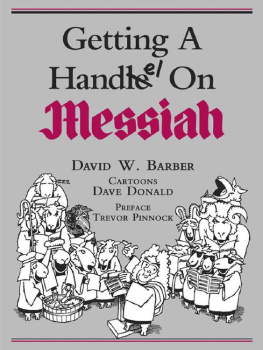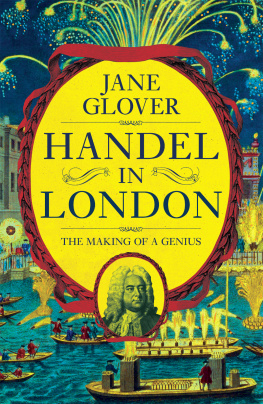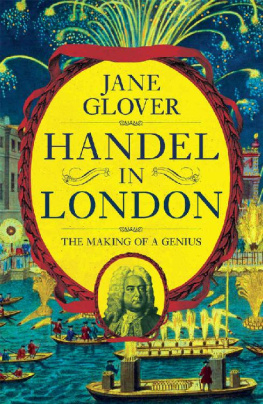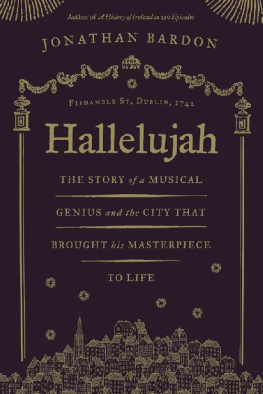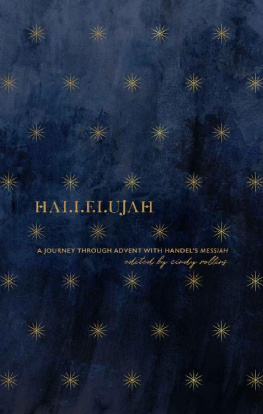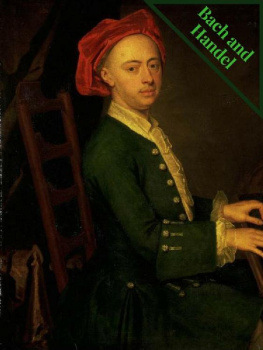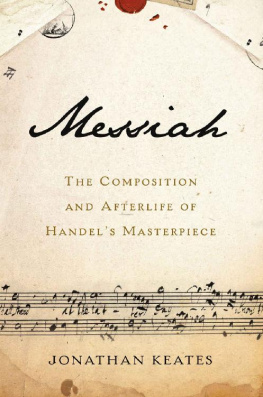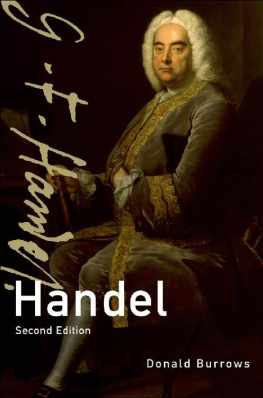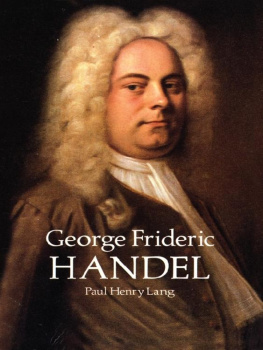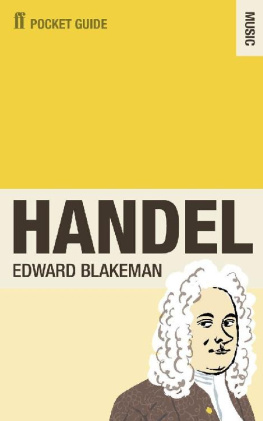

GETTING A HANDEL ON MESSIAH
David W. Barber 1994, 2011
ebook edition David W. Barber 2011
Illustrations Dave Donald 1994
Except brief excerpts for review purposes,
no part of this publication may be reproduced,
stored in a retrieval system or transmitted,
in any form or by any means, without the
prior permission of the publisher or, in case
of photocopying or other reprographic copying,
a licence from Canadian reprography collective
Access Copyright .
This ebook edition published in Canada in 2011
Indent Publishing
121 Shanly St.
Toronto, ON, Canada M6H 1S8
indentpublishing.com
contact@indentpublishing.com
ebook formatting by Web of Life Solutions
weboflifesolutions.com
Canadian Cataloguing in Publication Data
Cataloguing data for ebook available from Library and Archives Canada
ISBN 978-0-9878492-0-5
CONTENTS
Authors Note and Acknowledgements
I TS WITH A CERTAIN AMOUNT of trepidation that one takes on so enormously popular and important a work as Handels Messiah . But its precisely because of its popularity that Im sure Messiah will survive this irreverent yet affectionate little book of mine.
In keeping with the spirit of my previous books, the usual reminder applies: All the facts are accurate, the information here is true or at least as true as Ive been able to ascertain from all the various history and music sources Ive consulted. Since I wasnt actually there, I can only assume others before me got their facts straight in the first place.
Id like to thank Dave Donald for his witty cartoons and his help in production and design, and Jacques Lauzon of Indent Publishing for his help in getting this and my other books back into print, electronic or otherwise.
DWB
Westport, July 1994
and Toronto, November 2011
Preface
I AM AN UNABASHED Messiah enthusiast and Handel fan. The prospect of performing Messiah always fills me with excitement, as each performance is a voyage of discovery. Its rather like walking in a favorite place where each day you can see things in a new light or notice new details. I normally direct the work from the harpsichord, just as Handel did. It is easy to feel Handels spirit as I touch the keys and give life to pagebound notes.
Ive often asked myself what it is that gives Messiah its enduring popular appeal. Perhaps a clue can be found in the Dublin NewsLetter , 10 April 1742:
Yesterday morning at the Musick Hall there was a public Rehearsal of the Messiah which in the opinion of the best Judges, far surpasses anything of the Nature, which has been performed in this or in any other Kingdom.
Ten years later one enthusiast wrote to a friend: As much as I detest fatigue and inconvenience I would ride forty miles in the wind and rain to be present at a performance of Messiah in London under the conduct of Handel.
Haydn, upon hearing the work for the first time, was moved to tears and exclaimed: He was the master of us all.
For me, the appeal of the work lies in the directness with which we are made aware of Handels humanity. In a good performance the music unites audience and musicians in a whole range of emotions. Gleefully Handel invites us to go astray in All we like sheep , before revealing the cost of such action in the last bars. How deeply he moves us in the heartrending aria He was despised . And how uplifted we feel by the Hallelujah chorus.
Handel was well aware of the power of his Messiah. When Lord Kinnoull complimented Handel on the entertainment, Handel replied: I should be sorry if I only entertained them. I wish to make them better.
Handel knows his audience will arrive thinking of a hundred and one things, and his task is to get us to listen to the story. The overture settles us into our seats. Then Handel introduces an inspired touch: The tenor stands and sings, his first phrase containing only two words, Comfort ye. We settle back and start to listen.
I love this opening. It reminds me of Listen with Mother , a BBC radio program which I listened to as a child with my mother. Having announced the title of the story, the storyteller always asked, Are you sitting comfortably? Then Ill begin.
Luckily Messiah is quite resilient. It needs to be, for such a frequently performed work is prey to all sorts of dangers. Ive heard absolutely riveting performances of Messiah. But some performances I have found sanctimonious (too slow and solemn) overfashionable (too fast and secular) or complacent (boring). There are many different versions, even rock and soul arrangements, parts of which I have enjoyed. In the end all that matters is that the power of the work shines through. That is a good performance.
Those who have laughed their way through David Barbers earlier books will know that there are a lot of facts lurking behind his irreverent humor. So if you want to get a Handel on Messiah, read on.
Meanwhile, after having written these words I can hardly wait to get back to Handels music. At each performance of Messiah I feel with Haydn that He was the master of us all.
Trevor Pinnock
London, August 1994
CHAPTER 1
OVERTURE

Everybodys favorite oratorio
OVERTURE
H ANDELS MESSIAH IS PROBABLY one of the best-loved, and certainly one of the best-known, works in the standard repertoire of classical music. (For a more detailed discussion of problems surrounding use of the term classical, please see the chapter titled A Classic Problem in my earlier book If It Aint Baroque: More Music History as it Ought to be Taught. I just havent the energy to go over all of it again here, and besides, youd be doing your bit to support a struggling author.)
Messiah had its first production in 1742, and it has now been performed almost every year since for coming on three centuries. Like some hardy perennial, or maybe just a persistent weed, Messiah just keeps coming back, year after year.
Although Handel himself revived it frequently in the years leading up to his death, there was no performance of Messiah in 1744 and none again in 46 to 48. But these were just glitches. Since 1749, when it really got rolling, there probably hasnt been a year gone by when someone, somewhere didnt perform Messiah . (If there has, Id love to hear about it, just for the record.)
Music historian Stanley Sadie may be going a bit overboard when he calls Messiah the greatest single work in the English language (evidently married works need not apply), but theres no denying its many beautiful, inspiring or otherwise admirable moments. (There are also a few tiresome choruses Id just as soon be without Their sound is gone out , for instance, or But thanks be to God but I realize Im in the minority on this.)
Whatever its musical merits and lets just say theres some room for argument here there can be no denying Messiah has an enormous popular appeal. Audiences and performers alike may love it because its full of rousing choruses, flashy solo arias and some quieter moments that can, at least at the best of times, be genuinely poignant. Choir managers love it because you can almost be guaranteed to draw a big crowd, and tickets are easier to sell than for the choirs next performance that all-Schoenberg program, say, or the concert version of Bergs Wozzeck .
Next page
